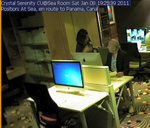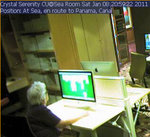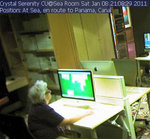it's 12.35
The day proceeds painlessly. I have finished all my work, including the office statistics, and sent them to the new boss.
I have then reclined my chair all the way to almost horizontal, so i can relax better, as I write here.
Less than 3 hours to go. About 2 and a half hours. But then he'll go to lunch, so it will be like being on vacation again, for about an hour. Then just one hour of suffering and I will be gone.
Now I would need a quick task from the investors, one of those things that take one hour or so. But they're AWOL.
So I'll need to find something by myself and I am going to go to the usual source of ideas, the "grid" at collective2:
http://www.collective2.com/cgi-perl/system/grid.mpl
The last method of proceeding was the one I used here:
http://www.trade2win.com/boards/trading-journals/85510-my-journal-2-a-181.html#post1336834
The reasoning here was that I first had to find good systems on collective2, and then I had to find out more about the guys behind them.
But an even better reasoning was that I just had to find anyone developing systems on futures, whether good or bad it did not matter, as long as they were in good faith. I just have to find blogs by developers of automated systems, and that way I can gather ideas for new systems.
However, since I already have so much in my hands, I will just wander in the collective2 web site, without a precise objective, because, unless it's something quick and a great opportunity (which I'd come across by wandering) I may not have the time to do a systematic search in this field.
So I will now just wander on collective2 and post ideas and links here, as they come to my mind and browsing.
It's 12.55 and I only have about 2 hours to go, and then I'll go home.
Ok, I could look up these good systems that I had listed here in the collective2 forum (which has a bad search engine though):
http://www.trade2win.com/boards/trading-journals/85510-my-journal-2-a-184.html#post1347792
Or I could just wander in it. Let's see if anything pops up:
https://www.collective2.com/cgi-perl/board.mpl?want=list
Or if I have to use the search engine, which sucks.
Nope. Not just the search engine but also the forum format sucks. I might have to dig deeper or abandon my little project.
Ok, abandoned.
I guess google, used with some reasoning, is just as good a source for strategies as collective2.
trading strategies for futures
Lucky, this seems good stuff:
http://www.tradingfutures.biz/
This is a short, sobering guide to futures trading. Tradingfutures.biz does not tell you how to make your first billion, but it does tell you how not to.
We also give you some useful futures trading links and a trading record sheet and we debunk myths which only serve to confuse traders and interfere tactically with their trading strategy. Sometimes the best advice is free.
1 A successful futures trading strategy
2 A brief account of my career as a futures trader
3 System trading
4 About brokers and churning
5 Trading stock index futures
6 Trading commodity and currency futures
7 Day trading versus position trading
8 A word about leverage
9 Options and other derivatives of derivatives
10 Stop loss orders stop losses, right? Wrong
11 Gaps are always filled, right? Wrong
12 Go with the flow, right? Er, right
13 Improvised rationalisations
14 Arbitrage Trading
Appendix 1 : Essential links for futures traders
Appendix 2 : A trading record sheet to print & use
Appendix 3 : Disclaimer : before you lose your shirt
Appendix 4 : Some more jargon
...
I am curious about this:
2 A brief account of my career as a futures trader
http://www.tradingfutures.biz/page2.html
Quoting the parts that interest me:
My career as a futures trader
So I had the perfect system, based on common sense and literally centuries of precedent. Looking back, if I had stuck with my original, simple plan back in 1989 to buy and accumulate, starting super-conservatively with just one single US, UK or Australian stock index futures contract and US$100,000 in my account, and accumulating one additional contract every three months, I would now be worth many, many millions of US$. At that time, the Footsie was being coy with 2,000 and the Dow was below 3,000...
After one year, I had doubled my capital from US$100,000 to just over $200,000. What effect did this have on me? Alas, dear reader, greed and arrogance are powerful companions to success in futures markets, and they sow your downfall. You say you would not be so foolish, but the forces that futures trading unleashes in the trader's psyche can be as powerful as any psychotic illusion.
I decided that, having tested myself for a year, I would now trade more aggressively, leveraging myself to a greater degree than previously planned. To offset this higher risk, I diversified, trading in four indices : the S&P 500, the Footsie, the Australian SPI, and, fatally, the Nikkei. Greed was taking precedence over planning.
As the Nikkei slumped into its long coma, I began to short it, successfully of course but at the cost of abandoning the beautiful simplicity of my original plan, which foresaw no shorting at all. I remember telling my wife incredulously "I just made $20,000 in less than 15 minutes". I omitted to tell her that I lost it again in less than 10 minutes.
Fascinating stuff. This guy definitely exists. So I'll read with more interest the rest of his web site.
By now my Melbourne broker was phoning me at 7 am each morning to talk me through the opening of the Sydney market. His aim, of course, was to wean me from my original plan which would have paid him peanuts in broking fees, and get me to trade both ways, short and long, and on a daily rather than 3-monthly basis. He did this by making me feel important and by feeding me the noise they call market gossip.
I ended up quoting everything I read so far, by how interesting it is.
He succeeded. It wasn't long before I completely lost sight of my plan and was adrift in an exciting sea of risk and uncertainty - the proper name for this is not trading : it's gambling. I remember one fateful night when I massively shorted the Nasdaq at its opening. It had been a long, hard day at work. I had a glass of red wine beside the computer. My eyes felt irresistibly heavy. As my head sank onto the desk, the Nasdaq soared. I woke an hour later, some US$70,000 poorer.
This reminds me of me. After a few trades I lose control and start getting addicted to it. The only change for me has been - after 13 years of gambling - the investors I keep mentioning. They totally took the addiction factor out of it, because for choices on both their accounts and mine, we have successfully implemented a policy according to which I need to ask them first, and it has been working completely, also in that they don't give in to my pressure, during my compulsive gambling relapses. Yes, I blame them for not letting me include the GBL_ID the other day, which would have gotten us to make 650 dollars. Maybe that was not gambling, it was just a calculated scaling up. But hey, I am the one who asked them to monitor me on my account - how can I blame them for resisting my scaling up plans? It's exactly what I wanted. I needed someone to tell me "no" sooner or later. Damn, it sucks though. Actually I didn't want them to tell me "no" this time, but I am glad they're capable of stopping me. Probably this time it would have been better to let me have my way, but sooner or later my suggestions for scaling up would have been excessive. Let's say they stopped me one step earlier, after which I would have relapsed into gambling. Anyway let's keep reading.
It's 13.22 and he left. Less than 2 hours to go.
Altogether I lost about three-quarters of a million US dollars (real ones, before those George Bush dollars), and then I had to stop. I am now too old to execute my original plan, and in any case I can no longer spare enough capital to execute it safely.
Holy cow.. this is one painful admission about a painful reality. Time flies, especially if you have no capital. And if you have it, you're screwed anyway, because with trading you just lose it at the start.
The ideal situation would be if someone was forced to paper trade until he achieves (consistent) profitability. But usually (except my case with the investors) one is on his own, and you'd have to force yourself to paper trade before you know how to trade, but you don't do it, because most of us think we're smart and we can get it right from the start, and that it'd be a waste of time to paper trade. Excluding the money I lost which I had previously made, I have lost, from 1997, when I started, only about 50 thousand dollars, which is not that much considering I've lost less than 4k per year, and about 300 dollars per month, but if I had that money now, I could actually retire tomorrow, because it would allow me to make at least 5000 dollars per month.
But hey, who's going to paper trade for 13 years? If I did, now I'd have 50k set aside, and a guaranteed profit of 10k per month. But even when i started trading with the investors six months ago, I did not have a clear idea of what my best systems were. So what I am saying is that I should have paper traded from 1997 up to December 31, 2010, because that's when the systems started producing real money again (after dropping all the bad ones). No one is going to paper trade for that long, no one.
Yes, this morning I was thinking of how I could speed things up at the start, without being reckless, because the investors would not allow it, for my own safety.
The answer is a loan from my bank. Yes. But I am not sure yes. What I am getting at is that I never asked for a loan (I am still paying a smaller loan I asked a year ago) while I was in control of my gambling. Now I'd have little to fear, and if I wired even just 10k to my own account, then it would be safe and the investors would allow me to scale up to the best 5 systems I have. But then... what if I lose it? I am going to have to work at the bank for the rest of my life to pay back, 300 euros at a time, the new loan plus the previous one. Right now i am already paying 180 euros a month for the previous loan, and it will keep going like this for another 4 years.
That was a loan I asked when I was still a gambler, though. I totally blew the money they gave me within a few months of getting it. It really sucked.
So I'll wait. I'll find another way of getting that 10k or 20k I'd need. Or I'll just wait till I get paid by the investors (with a percentage of their gains from my systems). It will take patience.
But let's keep reading.
It's now 14.00. Just one more hour to go. I went to have some tea with one of the hard-working colleagues I have. We don't go on 5 coffee breaks per day like those slackers. Once a week, during lunch break, we go for 15 minutes and have a tea at the vending machines.
This is next,
"Gaps are always filled, right? Wrong":
http://www.tradingfutures.biz/page11.html
Good stuff, but I knew it from my testing. And partly he is wrong, because I do have one system on opening gaps that works. So yes, they don't always work, but you can build a system based on the expectation that they will tend to get filled.
Reading this now:
http://www.tradingfutures.biz/page1.html
A successful futures trading strategy
Back in 1989, I was 42 and living in Java. I decided it was time to do something about my old age. I knew the traditional pension wouldn't be enough. Nor would buying and accumulating physical stock. It had to be leveraged, but at the same time it had to be safe. My argument went like this...
...it doesn't take a mathematical genius to work out that you would have made spectacular profits over almost (and there's your risk : almost) any 10-year period in documented history. And of course you would accumulate as you went, in small increments starting from a humble single futures contract, until after ten years you had a portfolio worth millions in any currency.
Now I am just quoting, without commenting, because it's taking too long to comment everything i read.
http://www.tradingfutures.biz/page3.html
System trading means any approach to trading which relieves you of the tiresome task of having to exercise your judgment, giving you instead a 'machine' for trading : the system automatically tells you when to buy and when to sell. All you have to do is pay for the system in the first place, and then you can watch TV while the system transforms you into a billionaire.
There are people, including some brokers, who will solemnly tell you that it is irresponsible to trade without a system, that the impersonality of a system is a necessary discipline to prevent you from treating the market as a casino.
They omit to say that gambling is not the only alternative to using a system. Another is something sensible and conservative along the lines described on page 1. Yet another is the kind of macro-economic judgement that George Soros exercised in his successful campaign against the pound. Yes, I would call such massive, nail-biting punts 'campaigns', whose end is determined by the fulfilling of the predicted event, in this case a big fall in the value of the pound.
And here's where he gets me upset:
Think about it : if it were possible to devise a system for trading profitably, the owner of that system would become almost infinitely wealthy, and the markets in which he traded would cease to operate as indicators of real value. It's just plain silly to think that there's some way you can varnish your toe-nails while a 'system' gets you rich. If their system worked, it wouldn't be in their interest to sell it. The fact is, successful trading requires sound judgement and always involves some degree of risk.
He says that automated trading systems do not work and if they worked they would make the owner infinitely rich. That's total bull****. I know they work, I see it work, and I can count on at least 10% per month. But now tell me how can I grow infinitely rich if I am starting with 2000 dollars (which is what I started with just two months ago).
Let me use excel here.
After 1 year:
6 thousands
2 years:
20 thousands
3 years:
62 thousands
4 years:
194 thousands
5 years:
609 thousands
6 years:
2 millions
7 years:
6 millions
8 years:
19 millions
Then the systems stop working because you're trading too many contracts and they start affecting prices (your bid-ask spread increases).
So did I get infinitely rich? Nope. This proves that even if systems work, you don't become infinitely rich.
Let's keep reading. There's some interesting thoughts that sound great but are partly wrong:
~ The notion that markets move in waves, whose motion can be scientifically predicted. This is a particularly popular one because "after all, you only have to look at any chart to see that such waves exist". Yes, but try predicting the level of any given wave at any given time and you will find it is as futile an exercise as doing the same thing with real waves on a beach.
This guy is knowledgeable, a great writer, convincing, and yet wrong:
~ The notion that markets move in multiples of special numbers (Fibonnaci numbers are the best known), such as 33.33% or 66.66% or in special shapes such as triangles of a particular shape. Gann, an architect of such magic shapes and numbers, is said to have died rich, but a book called "Winner Takes All" debunks this claim, saying he died a pauper. Linked to this is a ridiculous story that a group of Pygmalion-style beginners called "Turtles" was trained in the master's cunning ways and all became millionaires subsequently (and so can we all, for a fat fee).
And here is how I know that this guy doesn't know enough about system trading:
Almost none of these systems is, in fact, 'automatic' and therefore they are not systems at all. Buried deep in the instructions you will find phrases such as "traders should exercise their judgement" before making a trade. The reason for this is obvious : if the system were 100% automatic, it would be easy to test and its failure would immediately be clear for all to see.
That is what we mean by "back-testing", "forward-testing", "in-sample", "out-of-sample", "sharpe ratio" and other performance parameters. Obviously he doesn't know anything about this.
http://www.tradingfutures.biz/page4.html
Brokers die if you don't trade, and become fat and sleek if you trade often. It is therefore in their interests to encourage you to "churn" your account, i.e. keep buying and selling mindlessly.
In my experience, Australian futures brokers have been the worst in this respect. They were laid back and disarmingly unprocedural, leaving the client wide open to psychological manipulation. Here's an example of how an Australian broker got me to "churn" my account : he interrupted a business meeting with an "urgent" call to tell me that President Gorbachev had pneumonia and, with his weak heart and all, could die, ergo Glasnost ends and the Cold War returns and world markets crash, ergo sell.
Now, I'm in this meeting in Java right, so the other people are listening in awe as I interrupt the meeting to sagely discuss Gorbachev's health with a broker 5,000 km away. Being older and wiser now, I would laugh and put the phone down. But then I felt self-important and flattered that he would call me from overseas. I couldn't resist making the trade in front of my business colleagues, who were suitably impressed. Result : a win for the broker and a loss for me.
Scales fell from my eyes when I later visited Melbourne and discovered that this expert in world economics and politics was a hungry-looking youth of not much more than 20.
This time what he wrote is wise, pleasant and humorous.
More food for thought:
http://www.tradingfutures.biz/page10.html
Another fond illusion, I'm afraid.
Brokers make a sizeable proportion of their fees, sometimes approaching 50%, from stop-loss orders. No wonder then that many brokers will solemnly warn you that you are irresponsible if you do not always have a stop loss order in place for each and every position that you take. In many cases they will actually require it.
At first sight it seems sensible, but look again.
Unscrupulous brokers will encourage you to place your stop close to your original price, virtually guaranteeing that it will be triggered, thus churning your account at your expense.
If you place your stop a long way from the original price that you paid for the contract, there's hardly any point in placing it - all it may protect you from is a collision with an asteroid belt.
And if you place it too close, you'll get "stopped out" only to see the market move back in your favour. Remember, markets constantly 'vibrate' up and down. It's really a lose-lose situation that benefits only the broker. And in a major crash (invariably followed by a rebound) your stop loss order will be executed a long way from its trigger price, amplifying your loss.
What to do? There's really no alternative but to decide from the start of your campaign at what price level you will abandon your overall, long-term position, and grit your teeth as the market moves against you in the short term. Be prepared for huge swings, calculating how much you can afford to lose, and consequently work out how much money you need to put at risk - a lot more than you think, when you work it out.
So yes, you need to have a stop loss order in place, but it needs to be a long, long way from your original position and its triggering should mark the end of your campaign. If you do it right, it will almost certainly never be triggered, to the chagrin of your broker and to your enrichment.
But then again there's always that asteroid belt.
Even more humorous innovative original provocative food for thought (sometimes wrong):
http://www.tradingfutures.biz/page12.html
So system trading is a sham, brokers can't be trusted, stop-loss orders don't stop losses, and gaps don't always get filled. Is nothing sacred?*
Well, when all else has failed and you are watching your life savings efficiently funnel themselves into other peoples' pockets on your state-of-the-art trading software, your broker will often pull out another hoary old adage : "Go with the flow". "You keep fighting the market", he tells you with all the tenderness and concern of a leech on a pig's haunch, "you're only playing it one way - you should go with the flow..."
Brokers like this expression so much they've invented another one that means the same thing : "The trend is your friend". Why are brokers so fond of mouthing these two aphorisms? Because...
1 It makes them sound smart.
2 They like simple rhymes because they have low IQ's.
3 It encourages you to trade more frequently, because it requires you to go both long and short, as the market mood changes. This is good for them, but bad for you because you simply eat up your capital in commissions.
Think about it : what exactly is the "flow" or the "trend"? The truth is it's an ever-changing ebb and flow of sentiment that, like the sea, can change direction at any time.
More importantly : the graph-line on a 5-minute chart may well be apparently heading upwards while the same market on a 60-minute chart is heading downwards, and then again on a daily chart it's heading upwards, but hey! - look at that strong down-trend on the monthly chart...
In short : one man's up-trend is another man's down-trend, and both can change direction at any time. Sorry.
This dude is right about everything except his concept that automated trading systems do not exist or do not work.
Now this is just awesome, because that's what I always thought journalists do all the time, on newspapers and on TV:
http://www.tradingfutures.biz/page13.html
Improvised Rationalizations
I recently had a Japanese student at my English language school who told me at his admission interview that he worked for a futures broker in Tokyo. I didn't tell him that I traded futures, otherwise he would have perceived me as a potential client and talked to me the way futures brokers talk to clients - less than candidly, in a nutshell.
"My word Sato," I said, "that sounds like an exciting job. How do you like it?"
"I hate it." he said with a dark look. "Every morning I go to work feeling bad."
"Why? Surely it's an exciting job with an international flavor and lots of money to be made?"
"My job is to think of reasons. Every day the markets go up or down, and our clients want to know why. So we have to find a reason. That is my job."
"You mean... you invent the reasons afterward?"
"Of course. That's my job. I hate it because every day they are waiting for me to come to work with a reason for yesterday's rise or fall and sometimes it's impossible to find a really good reason... Nobody actually knows why markets go up or down."
You have been warned.
It is 14.49. Just another 20 minutes here before going home. That web site was pleasant, interesting. I don't know if it will help me make any money, but it was pleasant to read. Now I am done and there's nothing more to read on it.
Now I will brush my teeth and then come back and go home. It is now 14.51, and in exactly 20 minutes I will be able to leave and go home.




















